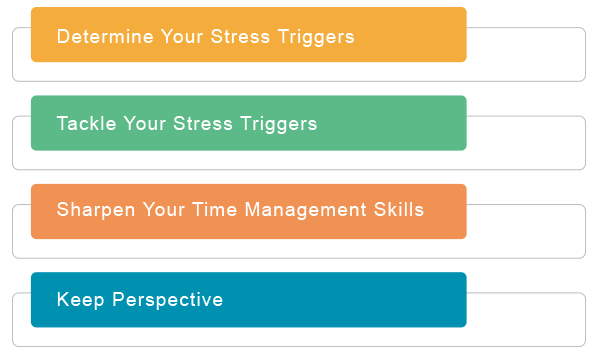By: Ola H. Azzouqa
 |
| Vector created by Jcomp - freepik |
Work pressure can be energy consuming; but it should not be. Face the triggers, keep a point of view, and know when to seek help.
The job you work in is a potential cause of stress, and the causes of workplace stress are many such as workload, interpersonal issues, inability to have a work-life balance, and job security. Sometimes, you may be sensitive to certain stressors that don't seem to bother others. However, you can combat the effects of stress at work. Effectively dealing with stress at work can benefit your professional and personal life. Here are some tips to help you deal with it.
Determine Your Stress Triggers
Your personality, experiences, and other unique traits all affect the way you respond to and deal with stress. Situations and events that put your colleagues under stress may not cause you stress at all.
The Mayo Clinic advise you to know your stressors and stress triggers; for a week or two, write down the situations, events, and people that cause you to have a negative physical, mental or emotional reaction. Then record a short description and answer questions such as:
- Where have you been?
- Who is causing you to feel stressed?
- How did you react?
- How did you feel?
Then, evaluate your stress inventory. You may find clear causes of stress, such as the threat of losing your job, an uncertain future, or obstacles with a particular project. You may not feel in control of your decisions at work, or your expectations may be unclear. You may also notice minor but persistent causes of stress, such as having to commute long distances or an uncomfortable workplace. If you are working from home, you may feel stressed as a result of trying to combine work with your personal life, such as meeting personal and family needs while working.
Tackle Your Stress Triggers
The same article published by the Mayo Clinic indicates that once the triggers of stress have been identified, consider each situation and look for ways and solutions to resolve it.
Suppose, for example, that you experience a decline in your performance at work because you have to leave to pick up your child from school. You can then coordinate with other parents or your neighbors to alternate picking up your children after the school day. Or you can start work earlier, shorten your lunch break, or take work home for the evening.
Usually the ideal way to cope with stress is to find a way to change the circumstances that cause it.
Sharpen Your Time Management Skills
In addition to determining your stress triggers, it's often helpful to improve your time management skills, especially if you're feeling overwhelmed or under pressure at work. For example:
- Set realistic goals: Collaborate with colleagues and leaders to set realistic work expectations and deadlines. Establish regular evaluation criteria that measure your progress and adjust your goals as necessary.
- Make a list of priorities: Crate a list of tasks and arrange them in order of priority. Periodically, scan your list and work on tasks according to their order.
- Protect your time: For important or challenging projects, set a time to work on it without interruption. Also, break larger projects into smaller parts.
Keep Perspective
When your job is stressful, it can negatively affect your life. To maintain a positive perspective:
Talk to other people: Talk to trusted colleagues, family members, or friends about issues you're facing at work and express how you feel. Perhaps someone will offer you ideas or suggestions for coping. Sometimes just talking about stressors can be comforting.
Take a break: make the most of your work breaks. You may feel energized and refreshed by taking just a few minutes of personal time. Also, take time off and relax whenever you can, whether it's taking a long vacation or enjoying a long weekend. Relaxing breaks can help you have more energy when you return to work.
Give yourself a breather: To avoid extra stress from work, make time for activities you enjoy, such as reading, meeting friends, or practice a hobby.
Take care of yourself: Take good care of your health. Your daily routine should not be without physical activities, get plenty of sleep and eat healthy. Try relaxation techniques such as yoga, meditation, mental focus and deep breathing.
Set limits: set boundaries between professional and personal life. For example, avoid checking emails in the evening or during the weekend, do not use the computer in the evening, and stick to fixed work schedules. Also make time to avoid using your phone or computer, whether it's browsing emails, texting, or following social media.
Know when to ask for help
These were some tips for dealing with stress based on personal experience and collective knowledge from various relevant sources.
Recognising the causes of stress is the first step in stress management. After you’ve figured out what your stressors are, you can take steps to avoid them. Do not hesitate to seek professional help, and do not wait too long to ask for it, especially if none of these steps relieve work-related stress. Know that this is common and you are not alone in this.


No comments:
Post a Comment